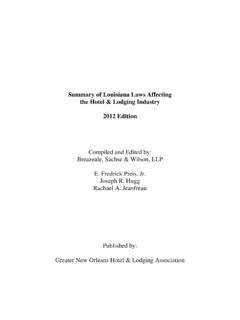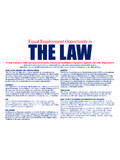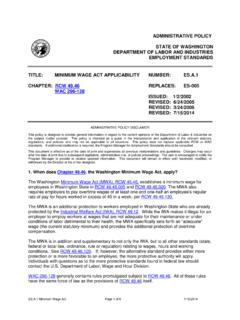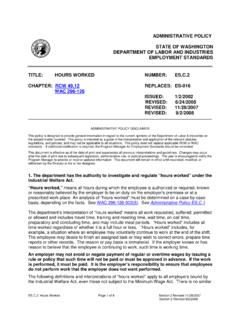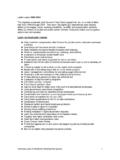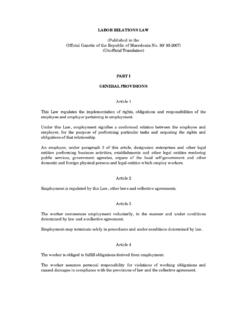Transcription of AN OVERVIEW OF LOUISIANA EMPLOYMENT LAW
1 AN OVERVIEW OF LOUISIANA EMPLOYMENT LAW Lemle & Kelleher, LLP 2009 Baton Rouge One American Place 301 Main Street Suite 1100 Baton Rouge, LA 70825 Phone: Fax: Houston Bank of America Center 700 LOUISIANA St. Suite 2060 Houston, TX 77002 Phone: 713-247-0030 Fax: 713-247-0024 New Orleans Pan-American Life Center 601 Poydras Street 21st Floor New Orleans, LA 70130 Phone: Fax: MODERN MANAGEMENT Page i TABLE OF CONTENTS DISCRIMINATION Age Discrimination 1 Disability 1 Civil Rights Act for Handicapped 2 Race, Color, Religion, Sex and National Origin 3 Pregnancy, Childbirth and Related Medical 4 Sickle Cell Trait 4 Genetic Trait Discrimination And 5 5 Political 5 labor 5 Jury 6 Prohibition of Smoking Discrimination 6 Employee Protection From 6 Right to 7 School and Day Care Conference and Activities 7 Military Service Relief 8 Environmental Whistleblower s 9 Bone Marrow Donor Leave 10 Non-Smoking Requirements of LOUISIANA 10 LOUISIANA s Gun 11 Prohibition Of Discrimination In Places Of Public 11 La.
2 Constitution of 1974, Article 1, Section 12; La. 49:146; La. 46:1951-56; 121:51-52; 51 11 Employer Reporting Program La. 46 11 LOUISIANA Commission on Human Rights Act La. 51:2231 et 12 GENERAL EMPLOYER EMPLOYMENT References between Financial 12 Notices Required to be 12 LOUISIANA Group Health Insurance Continuation 12 Group Insurance for Surviving 13 13 Wage Payment 14 Contracts Forfeiting 14 15 Loans to 15 Employee 15 Medical and Other 15 15 Non-Competition 16 EMPLOYMENT of 16 Workers Exposed to Toxic 17 Workers Compensation 17 Page ii LOUISIANA EMPLOYMENT Security 18 Tax Credit for Persons Providing 19 Drug Testing 19 Unfair Trade Practices 19 Uniform Trade Secrets 20 EMPLOYMENT at 20 Page 1 INTRODUCTION In addition to the numerous federal labor laws and regulations, LOUISIANA employers must comply with the State's laws governing the relationship with their employees.
3 These State laws fall into two general groups: a) Discrimination laws, and b) General employer obligations. An employer often encounters issues and obstacles in its efforts to comply with these laws. This pamphlet is not intended to address all of the concerns that employers must deal with under LOUISIANA State laws, rather it is intended to assist employers and managers in recognizing potential problems and analyzing EMPLOYMENT decisions. DISCRIMINATION LAWS Age Discrimination La. 23:302; 23:303; 23:322 et seq. This statute prohibits discrimination against individuals forty years of age or older with respect to hiring, segregation, classification, discharge, compensation or other terms, conditions or privileges of EMPLOYMENT . It applies to employers with twenty or more employees within the State. Employer is defined to include a person, association, legal or commercial entity, or the state, its agencies, boards, commissions and political subdivisions.
4 Excluded is EMPLOYMENT of an individual by a parent, spouse or child or EMPLOYMENT in the domestic service of the employer. The statute also provides protection for retaliation for opposition of any practice made unlawful by the statute or because an individual participated in any investigation or proceeding brought under the statute. The employer is not prohibited from actions where age is a bona fide occupational qualification reasonably necessary for the normal operation of that business or where based on reasonable factors other than age. Nor does the statute prohibit an employer from observing the terms of a bona fide seniority system or employee benefit plan. A victim of age discrimination can bring suit and seek back pay, benefits, reinstatement, front pay in lieu of reinstatement and reasonable attorney's fees, and court costs.
5 Disability Discrimination La. 23:302; 23:303; 23:322 et seq. Employers with fifteen or more employees are prohibited from discriminating against an "otherwise qualified disabled person" who with "reasonable accommodation" can perform the duties of the particular job or EMPLOYMENT Page 2 position that such person holds or desires. An employer cannot discharge, segregate or classify, or refuse to hire, promote, or reasonably accommodate an "otherwise qualified disabled person" on the basis of a disability when it is unrelated to the individual's ability, with reasonable accommodation, to perform the duties of a particular job. The statute also prohibits employers, labor organizations and EMPLOYMENT agencies from discharging, failing or refusing to hire or promote and from other discriminatory actions against an otherwise qualified disabled person on the basis of physical or mental examinations or pre- EMPLOYMENT interviews which are not directly related to the requirements of the specific job or not required of all employees or applicants.
6 It also prohibits the same acts against an otherwise qualified disabled person when adaptive devices or aids may be needed to enable the individual, at the individual s expense, to perform the specific requirements of the job. This law also contains restrictions regarding the making or use of written or oral inquiries or form applications that elicit or attempt to elicit information concerning a disability or expressing a preference, limitation or specification based on a disability and regarding the making, keeping or disclosing of a record of a disability of a prospective employee. A defense may be available to an employer, labor organization or EMPLOYMENT agency when an alleged application of qualification standards, tests, or selection criteria that screen out or tend to screen out or otherwise deny a job or benefit to a disabled person is shown to be job-related and consistent with business necessity and the performance of the job cannot be accomplished by reasonable accommodation.
7 Qualification standards can include a requirement that an individual shall not pose a direct threat to the health or safety of himself or others in the workplace. A victim of disability discrimination can sue for compensatory damages, back pay, benefits, reinstatement, front pay in lieu of reinstatement, reasonable attorney s fees and court costs. Civil Rights Act for Handicapped Persons La. 46:2251 et seq. This Act applies to employers with fifteen or more employees. It provides that it is unlawful to discriminate on the basis of a handicap or perceived handicap against an "otherwise qualified person," that is one who, with "reasonable accommodation," can perform the essential functions of the job in question. A handicapped person who believes he has been discriminated against may sue for damages, attorney's fees, costs and "any other relief deemed appropriate.
8 " The Act requires thirty day written notice to the employer before suit can be filed. Page 3 Race, Color, Religion, Sex and National Origin Discrimination La. 23:302, 23:303, 23:332 et seq. Employers that employ more than fifteen employees within the State are prohibited from discriminating against individuals on the basis of an individuals' race, color, religion, sex, or national origin in regard to hiring, discharging, segregating or classifying, compensation, and terms, conditions and privileges of EMPLOYMENT . The statute also makes it unlawful for an EMPLOYMENT agency to fail or refuse to refer for EMPLOYMENT any individual based on the same protected characteristics. Nor can labor organizations exclude or expel from their membership, classify or segregate or cause an employer to discriminate against any individual included in the protected categories.
9 It is, however, not unlawful discrimination for an employer to hire and employ individuals on the basis of religion, sex, or national origin in those certain instances where religion, sex, or national origin is a bona fide occupational qualification reasonably necessary for the normal operation of that particular business or enterprise. Nor is it illegal under the statute for an employer to apply different standards of compensation or different terms, conditions or privileges of EMPLOYMENT pursuant to a bona fide seniority system or merit system or a system that measures earnings by quantity or quality of production or to employers that work in different locations as long as it is not based on race, color, religion, sex or national origin. An employer is free to administer and act on the results of a professionally developed test where such test is not designed, intended to or used to discriminate because of race, color, religion, sex or national origin.
10 The LOUISIANA Anti-Discrimination statute is clear that the definition of employee does not include individual supervisors and LOUISIANA Courts have routinely dismissed claims brought against individuals under this statute. Under the LOUISIANA Anti-Discrimination statute, an employer is defined as a person, association, legal or commercial entity or the state, its agencies, boards, commissions or political subdivisions receiving services from an employee in return for any compensation. The statute specifically states that an insurer shall also be an employer with respect to the appointment of agents regardless of the character of the agent s EMPLOYMENT . Excluded from the definition of employer are private educational or religious institutions and non-profit corporations. Like the LOUISIANA Age Discrimination Statute, it does not apply to the EMPLOYMENT of an individual by his parent, spouse, or child or to EMPLOYMENT in the domestic service of the employer or insurer.
